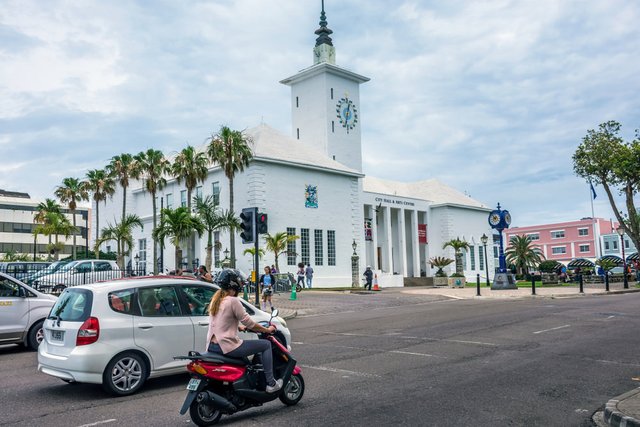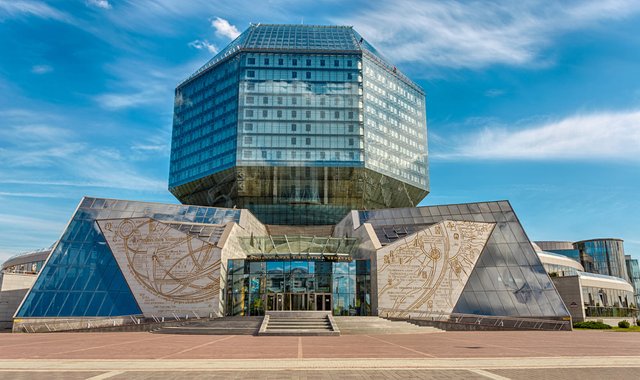Where cryptocurrencies and blockchain are thriving
Cryptocurrency and blockchain have created a furore in the past few years with regulators across the globe looking at ways to reign in the fast-moving technology. Yet for every nation that takes a cautious stance, there are others that have thrown open their doors to blockchain innovation.

In some countries, hotbeds of crypto activity are beginning to happen
Every week brings news of a decentralized application, platform or blockchain startup, ranging from fraud management to wine shipment tracking, and its popularity shows no sign of slowing.
But the key to crypto success is mass adoption of the alternative form of payment and in some countries, hotbeds of activity are beginning to happen. It is no surprise that these blockchain hubs have sprung up in those cities that have created legal and regulatory frameworks to help cryptocurrencies and blockchain applications thrive.
Here are some of the most surprising top spots and the reason for their competitive advantage.
Prague
According to research conducted by Forbes, Prague was top of a list of Bitcoin cities in the world. This was based on the number of cryptocurrency-related enterprises located there taken from Coinmap data.
The Prague Bitcoin boom could have been aided by a statement published last year by The Czech National Bank entitled: “Don’t be afraid of bitcoin.” This discussed whether cryptocurrency poses a threat to the traditional banking system.
It said that Prague was the home to a strong community of cryptocurrency supporters and users and said that there was “is no reason for banks to fear” Bitcoin and cryptocurrency as virtual currency adoption was “negligible in its size and scope”.
This approach saw enormous growth in the number of Czech companies accepting Bitcoin. And earlier this year, one of the largest manufacturers of cryptomats, General Bytes, installed 10 new cryptocurrency ATMs throughout the Prague subway.
The subway was chosen because it is used by an average of 1.6 million people in only one day. In order for users to quickly find a cryptomat, special maps with the location of Bitcoin-devices are hung in the subway.

According to research conducted by Forbes, Prague was top of a list of Bitcoin cities in the world.
The country has, however, taken a stance against using cryptos for money laundering purposes and tax evasion. It passed a law requiring all exchanges to release the real names and details of Bitcoin traders and exchangers in the country to prevent them from engaging in illegal activities using Bitcoin as a means of transaction.
Buenos Aires
Buenos Aires was number two on the Forbes list, beating tech hub San Francisco that was placed third and coming ahead of cities such as Madrid, New York, Spain, Amsterdam, Bogota, Vancouver, London, and Paris.
The country has made several lucrative legislative changes, leading to operators in the country vowing to install Bitcoin ATM’s across Argentina. The Argentine government is itself using blockchain technology in the form of decentralized application Opentimestamps to keep records of daily official bulletins.
In addition, some banks in Argentina have departments that exclusively deal with cryptocurrency companies. This is in contrast to neighbouring Chile that closed down all accounts to cryptocurrency companies in commercial banks, basically closing down the industry in the process.
WISeKey International Holding, a leading Swiss Cybersecurity company also recently signed a cooperation agreement with the Argentine government to launch a Blockchain Center of Excellence in Buenos Aires.
One reason why citizens in countries such as Argentina have become some of the earliest adopters of cryptocurrency could be because it offers more protection against inflation then fiat.
Nathan Lustig, venture capitalist and blogger, said that with an inflation rate of 32% per year (or higher) and a restrictive foreign exchange policy, Argentina was a prime location for cryptocurrency adoption.
He said: “Buenos Aires currently beats out most global cities for businesses that accept Bitcoin, with 6.1 businesses that accept Bitcoin per one million people, while New York has just 4.7 Bitcoin-accepting businesses per one million people.
“Beyond cryptocurrency, Argentina has also become a hotbed for blockchain startups that are using this new technology to revolutionize contracts, finance, and fundraising.”

A report by Deloitte positioned Israel as a hotspot for blockchain startups.
Israel
A report by Deloitte in 2016 said that Israeli financial institutions had always been open to innovation and the country’s unique experience with fintech, cyber and cryptography, positioned Israel as a hotspot for blockchain startups.
It said that the “startup nation” offered a unique atmosphere of collaboration, innovation, and entrepreneurship, and is supported by unique academic knowledge, with some of the leading cryptographers and computer science engineers in the world.
The report highlighted 38 startups located in the country and involved in the blockchain technology buzz, that all had the potential to “advance blockchain technology to new frontiers”. It added: “Although the blockchain ecosystem is currently most associated with Bitcoin, the Israeli companies and entrepreneurs are developing solutions that have the potential to disrupt various industries.”
Two years later and the number of startups has trebled. To such an extent that Gil Devora, cofounder of The Floor fintech and cybertech innovation platform headquartered at the Tel Aviv Stock Exchange, believes that in ten years it will be in every household in Israel.
He said: “When we established The Floor two and a half years ago, top-tier banks came here looking for fintech and cybersecurity solutions. In Israel today, there are about 500 fintech and 500 cybersecurity companies. One of our banks works with 19 fintech companies, 16 of them Israeli. But at that time there were only about five blockchain companies. Now that number has grown to about 120.”

In June, the Maltese Parliament voted unanimously to approve three cryptocurrency and blockchain bills.
Malta
Malta’s progressive attitude towards cryptocurrencies and distributed ledger technology has already attracted some of the world’s largest crypto exchanges who have either relocated or opened new offices in Malta.
Binance, the world’s biggest crypto exchange that enjoys trade volumes of more than $1.5bn a day, announced it was moving its headquarters out of Asia after feeling regulator pressure first in Shanghai, then in Hong Kong and Japan.
Since then other exchanges have expressed interested. CEO of Tron, Justin Sun, said he strongly supports Prime Minister Joseph Muscat’s pioneering plan to attract blockchain-based companies to the island. He added that he looked forward to building a “blockchain island with the Maltese government.”
Why the attraction? Could it be the fact the Government announced in January that it was in the process of establishing a practical legal framework built upon three pillars, consumer protection, market integrity and financial stability?
In June, the Maltese Parliament voted unanimously to approve three cryptocurrency and blockchain bills. The move was designed to make it easier for blockchain companies to set up in the country.
According to Malta’s Junior Minister for Financial Services, Digital Economy and Innovation, Silvio Schembri, the passing of the recent laws makes Malta the first country to offer a holistic regulatory framework for distributed ledger technology operations. In other words, these laws not only deal with digital currencies but the technology behind it.
Some examples of innovation include the government’s partnership with a British blockchain platform, Omnitude, to improve the island’s public transportation network.
Since 2017, it has also been collaborating with Learning Machine Technologies on a pilot program to allow Maltese higher-education and vocational students to access and retrieve educational transcripts and records using blockchain technology.

Many multinationals are already attracted by Zug’s low tax
Zug
Malta will see some competition in Europe from Switzerland that has started a so-called crypto valley in the canton of Zug. Many multinationals are already attracted by Zug’s low tax that charges just 14% corporation tax.
The tech-friendly ethos has also become a part of civic life, with the city even recently trialling a blockchain-based voting system. Through the experiment, citizens voted via smartphone for an “invented issue.” And, while the turnaround was reportedly not all that high, participants found that the process was simple.
Oliver Bussmann, founder of Bussmann Advisory AG and president of the Crypto Valley Association, said that it was Zug’s high quality of life, openness, pro-business mindset and favourable tax structure that make the city attractive to people from around the world.
The Crypto Valley Association is an independent, government-supported association established to take full advantage of Switzerland’s strengths to build the world’s leading blockchain and cryptographic technologies ecosystem. Bussmann said it aimed to welcome crypto firms by “creating a soft landing ground for blockchain companies in Zug.”
The Swiss blockchain startup ecosystem has more than 430 startups with labs, incubators and accelerators, according to Bussmann. “Zug has long been home to citizens from around the world, with over 30%of its population being foreign nationals.”

In February, Gibraltar announced new legislation relating to tokenised digital assets
Gibraltar
In February, the Government of Gibraltar and the Gibraltar Financial Services Commission announced that they were developing legislation relating to tokenised digital assets (tokens), essentially those created and traded using distributed ledger technology.
After taking into account stakeholder feedback, they drafted legislation to regulate:
- the promotion, sale and distribution of tokens by persons connected with Gibraltar;
- secondary market activities relating to tokens, carried out in or from Gibraltar; and
- the provision, by way of business, in or from Gibraltar of investment advice relating to tokens.
While Gibraltar’s distributed ledger technology regulations, which came into effect on 1st January 2018, bring a licensing regime to intermediaries using the technology to store or transmit customer assets, they do not extend to the use of tokens as a means of raising finance, typically for early-stage start-ups.
The proposed token regulations will establish disclosure rules, requiring adequate, accurate and balanced disclosure of information to anyone considering purchasing tokens, and measures to detect and prevent financial crime such as money laundering and terrorist financing.
Siân Jones, Senior Advisor on distributed ledger technology at the Gibraltar Financial Services Commission, said: “Token regulation is the natural progression following the regulation of DLT Providers, being vital to the protection of consumers. One of the key aspects of the token regulations is that we will be introducing the concept of regulating authorised sponsors who will be responsible for assuring compliance with disclosure and financial crime rules.”

Bermuda has also been a leading player in the blockchain revolution
Bermuda
Bermuda has also been a leading player in the blockchain revolution. It has attracted blockchain and crypto businesses by promising “comprehensive blockchain legislation.”
Apart from passing the law to allow for fast approval of initial coin offerings, the British territory has a law in the works to open the doors to cryptocurrency exchanges and related services.
Premier David Burt said his government was modelling its approach on one it had taken with the insurance industry, in which Bermuda has become a major player. Bermuda’s multi-billion dollar insurance and reinsurance industries have “full regulatory equivalence” with both the US and the EU.
Burt added: “We believe over the last nine months that our government has shown that not only are we open for business, but we mean business.”

Belarus offers a number of benefits to attract technology professionals from around the world
Belarus
In December last year, Belarus’ president Aleksandr Lukashenko formally signed a “super liberal” bill signalling state support of blockchain and cryptocurrency.
The Decree legalizes businesses based on blockchain technology, as well as any activity related to cryptocurrencies and digital tokens. Unlike in other countries, in Belarus mining and exchange operations are not treated as “business activities” and moreover, are not taxed.
It officially came into force on March and signals a new dawn for the country, facilitating any form of cryptocurrency-related activity, and according to the leader should make Belarus “a tech country”.
Belarus offers a number of benefits to attract technology professionals from around the world including tax breaks until January 1, 2023. No taxes will be imposed on companies that profit from mining, issuing and placement of digital coins. The same applies to crypto-related income of private individuals from mining and trading cryptocurrencies. In the next five years, even crypto firms based abroad will not be taxed.
The aim is to ensure foreign capital flow and ultimately a better relationship with the West. For the purpose of creating and supporting innovative startups in the country, the government created the High-Tech Park that aims to become the mecca of the cryptocurrency operators in the country.
Since the decree, the number of new registrations with the High-Tech Park has increased by about a quarter in 2018. Residents of the High-Tech Park now work in 67 markets around the world.
Bigger isn’t always better
When it comes to regulating and embracing blockchain technology, it seems bigger isn’t always better. It is expected for cities such as New York, San Francisco and London to be at the forefront of technological trends and innovations. Yet as more capital is invested in these smaller hubs, an environment is being created to produce some of blockchain’s most promising startups.
Post written by Alison Bloomer
Alison Bloomer has written on finance, insurance and pensions for various trade publications and was former Managing Editor of Insurance Times.
Follow OpenLedger!
You missed out one
https://www.bloomberg.com/view/articles/2018-07-01/thailand-leads-in-crypto-by-skipping-the-big-debate